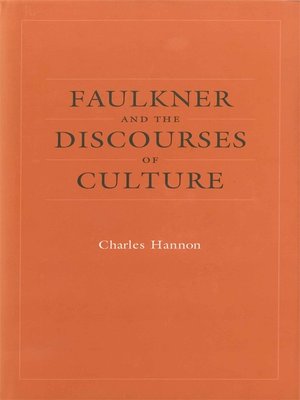
Sign up to save your library
With an OverDrive account, you can save your favorite libraries for at-a-glance information about availability. Find out more about OverDrive accounts.
Find this title in Libby, the library reading app by OverDrive.



Search for a digital library with this title
Title found at these libraries:
| Library Name | Distance |
|---|---|
| Loading... |
Throughout his career, William Faulkner produced a literary discourse remarkably contiguous with other discourses of American culture, but seldom has his work been explored as a participant in the shifts and ruptures that characterize modern discursive systems. Charles Hannon argues in his brilliant new study that the language of Faulkner's fiction is replete with the voiced conflicts that shaped America and the South from the 1920s to1950. Specifically, Hannon takes five contemporary debates — in historiography, law, labor, ethnography, and film — and relates them both to canonical and less-discussed texts of Faulkner.
Hannon employs a theoretical middle ground between Michael Bakhtin's stylistics of the novel and Michel Foucault's model of discourse as an autonomous self-regulated domain, while also drawing from the vast critical literature on Faulkner's fiction. He begins by linking the story cycle The Unvanquished to the battle over interpretations of American history as voiced by the Nashville Agrarians on the one hand and W. E. B. DuBois on the other. Next Hannon shows how Faulkner's detective fiction of the early 1930s and portions of his novel The Hamlet were affected by the emerging schism between adherents of a new school of legal realism and those bound to a more conservative formalist jurisprudence. According to Hannon, Faulkner's great novel Absalom, Absalom! reflects in its depiction of various forms of labor one of Franklin Roosevelt's major New Deal accomplishments — the Wagner Act of 1935 — as well as contract disputes in the agricultural and manufacturing South and in the film studios of Hollywood. Hannon discusses Faulkner's experimentation in The Hamlet vis-á-vis the development of the ethnographic method in the field of anthropology. He concludes with a fascinating analysis of the filming of Intruder in the Dust in Faulkner's hometown of Oxford, Mississippi.
Through Hannon's keen interpretive readings, Faulkner's texts emerge as a complex "node" in the larger discursive conflicts of his time. Though he often seemed to be detached from influence, Faulkner was, Hannon reveals, intensely attentive to ideas at the fore.







